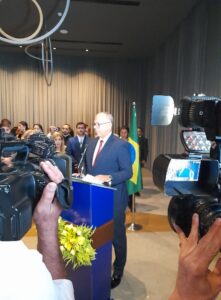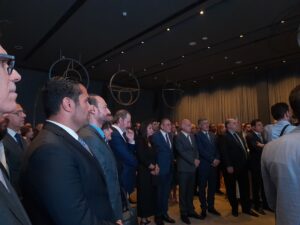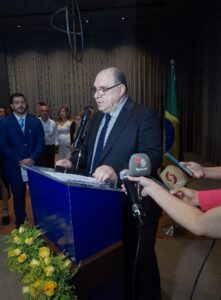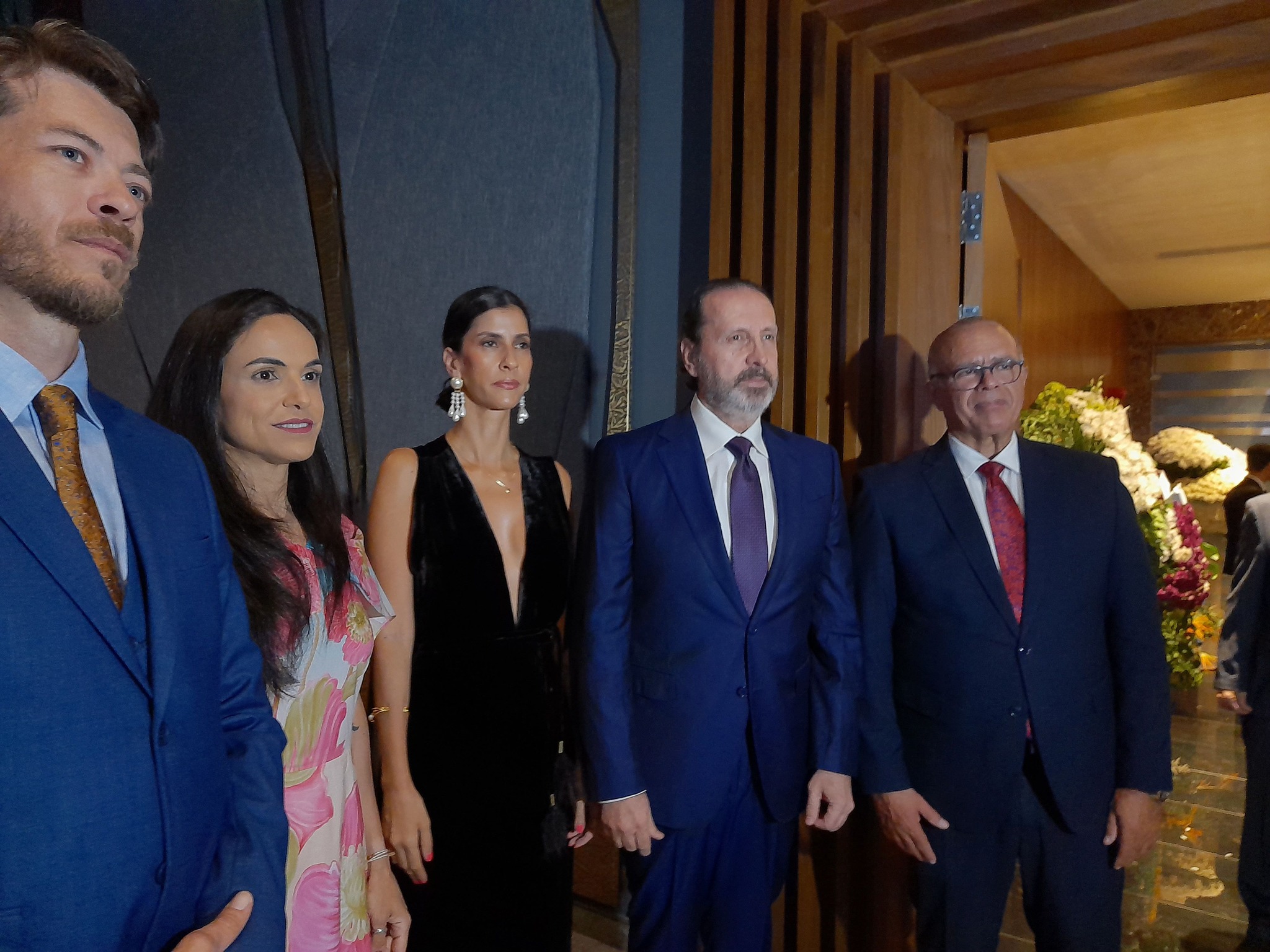The Brazilian Embassy in Damascus held a reception on Tuesday on the occasion of Brazil’s 202nd National Day at the Golden Mezzeh Hotel in Damascus. Brazil celebrates its National Day on September 7th every year. This occasion coincides with the celebration on the 79th anniversary of the establishment of diplomatic relations between Brazil and Syria.
His Excellency Mr. André Santos, the Brazilian Ambassador, said in a speech during the ceremony : “It is an honor and pleasure to welcome you here to celebrate the 202th anniversary of Brazil’s independence from Portugal and the 79th anniversary of establishing diplomatic relations between Brazil and the Syrian Arab Republic.
“Before I talk about the aspects of the relations between Brazil and Syria, I want to mention two relevant issues: first, I feel obliged to refer to the horrific events in Palestine, that can only be described as genocide on behalf the innocent in Gaza and the West Bank, savagely murdered by the Israeli entity’s army, and the terrorists known as settlers, and on behalf of all Syrian martyrs, I kindly ask you to join me in observing a minute of silence.
The second one is the following: after ten years of suffering bombardments from the Ukrainian military forces, the people of the city of Donetsk, since September 3rd , have been out of the range of shellfire thanks to the Russian troops’ advances and the Ukrainian retreat. Redemption at last!
On the 7th of September 1822, Brazil embarked on the Journey towards self-determination and sovereignty. The Spirit of independence that our forefathers fought for continues to inspire us today, as we strive to build a nation that stands for justice, equality, and opportunity for all, regardless of the color of their skin, their creed, their political views, etc..
These are values that we share with the Syrian people but both here and there face multiple obstacles and challenges, internally and externally, in our saga to build such a society and uphold such values.
Being a very diverse society, composed of native Brazilians, slaves descendants and immigrants from all parts of the world, it is only natural that in my country, opinions may differ as to how to best achieve the goals of justice, equality and opportunity for all.
 Syria, known as the cradle of the civilization, is no different in its people’s composition, having received and assimilated, throughout its millenary history, waves upon waves of foreign groups with their own customs and traditions.
Syria, known as the cradle of the civilization, is no different in its people’s composition, having received and assimilated, throughout its millenary history, waves upon waves of foreign groups with their own customs and traditions.
History shows that, both in Brazil and in Syria, these multiple differences have strengthened the process of nation –building, contributing to the creation of a sense of tolerance and conviviality . History, however , also teaches us to be cautious, because on specific occasions these differences can be used in malicious way, in attempt to sow discord, hatred and divisions.
These are values that we share with the Syrian people, but both here and there we face multiple obstacles and challenges, internally and externally, in our saga to build such a society and uphold such values.
Being a very diverse society, composed of native Brazilians, slaves’ descendants and immigrants from all parts of the world, it is only natural that, in my country, opinions may differ as to how to best achieve the goals of justice, equality and opportunity for all.
We live nowadays in a world where instant access to news and propaganda is available 24/7. People in general don’t have the time or the means to differentiate one from the other. Subjected to massive propaganda campaigns, the masses can be directed to specific behavior patterns, believing they are defending their own interests, and not someone else’s.
 We have seen it happen in the infamous “color revolutions”, or in campaigns that, overnight, turned yesterday’s friend in today’s worst enemy. That’s why it is very important that countries which share the same values, such as Brazil and Syria, unite their forces, on every international stage, to defend their sovereignty, the principles of the United Nations Charter, and the International Law. We must also join forces to free the international organizations from the grip of political forces that wish – and in many cases, have succeeded – to instrumentalism institutions for their own agenda. What has been happenings for years years at the Organization for the Prohibition of Chemical Weapons (OPCW), for instance, is a very illustrative example of what I am saying.
We have seen it happen in the infamous “color revolutions”, or in campaigns that, overnight, turned yesterday’s friend in today’s worst enemy. That’s why it is very important that countries which share the same values, such as Brazil and Syria, unite their forces, on every international stage, to defend their sovereignty, the principles of the United Nations Charter, and the International Law. We must also join forces to free the international organizations from the grip of political forces that wish – and in many cases, have succeeded – to instrumentalism institutions for their own agenda. What has been happenings for years years at the Organization for the Prohibition of Chemical Weapons (OPCW), for instance, is a very illustrative example of what I am saying.
During my first two years in Syria, I have concentrated my efforts on two fronts: first, I have worked within the Brazilian Ministry of Foreign Affairs for a more independent evaluation of the reports on Syria produced or influenced by the very countries that helped to finance the terrorist groups that have attacked Syria. I have succeeded on some occasions, but there is still a lot of work to be done.
My second front has been a much more pleasant one, as I have chosen cultural events as a channel of rapprochement (or rekindling) between the Brazilian and the Syrian peoples. With the help of Syriatel and the full support of the Ministry of Culture in Syria, the Embassy of Brazil in Damascus, through the promotion of cultural events in Syria and, in the near future, of a Syrian cultural event in Brazil, intends to provoke the curiosity of both populations in the cultural wealth available in both countries and, at the same time, counter some of the negative propaganda promoted in the mainstream media.
These are modest goals, by all means, but they are realistic. I have been reminded by a great man that small but solid steps can take you far, and I have strictly followed his words.
These are difficult times, no doubt about it. It is, however, when we face hardships that our true selves come out in full force. Both Syrians and Brazilians are known for their hard work and resilience, and I trust they will, once again, have the opportunity to tell their enemies “Not this time!” His Excellency Mr. André Santos concluded.
 In his turn, the Minister of Justice in the caretaker government, Judge Ahmad Al-Sayed, indicated that the relations between the two friendly countries are distinguished and deep-rooted, stressing Syria’s desire and insistence on advancing these relations and pushing them forward in all fields for the good and interest of the two countries and peoples and increasing joint cooperation within the framework of international organizations and blocs, most notably the BRICS group.
In his turn, the Minister of Justice in the caretaker government, Judge Ahmad Al-Sayed, indicated that the relations between the two friendly countries are distinguished and deep-rooted, stressing Syria’s desire and insistence on advancing these relations and pushing them forward in all fields for the good and interest of the two countries and peoples and increasing joint cooperation within the framework of international organizations and blocs, most notably the BRICS group.
The ceremony was attended by the Secretary-General of the Presidency of the Republic, Mansour Azzam, the Minister of Health in the caretaker government, Dr. Hassan Al-Ghabbash, the Governor of Damascus, Eng. Mohammad Tariq Krishati, the Assistant Minister of Foreign Affairs and Expatriates, Ayman Raad, a number of directors of departments in the ministry, a number of members of the people, ambassadors, and heads of diplomatic missions accredited to Syria
Reported and Photos by : Nada Haj Khidr

